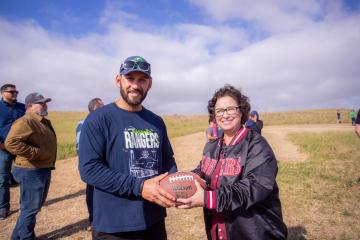High-ranking officials from the United States and Mexico opened a two-day conference on international human trafficking Thursday in San Diego.
They said anyone is at risk of becoming a victim.
Virginia Isaias, who was in the audience at the San Diego Sheraton on Harbor Island, nodded her head in agreement -- because it happened to her.
"I was kidnapped for three months in Mexico and was forced into prostitution," said Isaias, who lives in Orange County.
She said she fled an abusive relationship in Anaheim in 1997 only to be kidnapped by a sex-trafficking ring in Guadalajara and moved around different Mexican states.
"I was tortured. They did a lot of things to me," said Isaias, one of the subjects in a documentary called "Sands of Silence: Fighting Sexual Slavery and Trafficking."
Isaias escaped with her baby daughter after three months and returned to Orange County, where she began a long recovery.
"I focused on working," she said, and helping others who have been abused and forced into prostitution.
She has worked as a domestic abuse and mental health counselor and last year founded the Human Trafficking Survivor's Foundation, which provides education and other assistance to victims. She works with women's shelters and churches and is active raising awareness of the problem.
"Someone always calls me. There are victims who don't want to speak or don't have papers and never report what's happened to them."
Isaias was among the more than 150 people who attended the Bilateral Safety Corridor Coalition's two-day conference, which focused on the role business and transportation sectors are playing in fighting human trafficking.
The coalition is an alliance of more than 60 government and nonprofit agencies in the United States and Latin America working in the U.S.-Mexico border region to fight slavery and human trafficking.
More than 27 million people worldwide are victims of human trafficking, said Mark Lagon, the keynote speaker Thursday, and about two-thirds of them are bonded into forced labor in Southeast Asia. He is the former director of the Office to Monitor and Combat Human Trafficking in Persons at the U.S. State Department.
In the United States, 40 percent of human trafficking victims are from Latin America and 40 percent are from Asia, he said.
Human trafficking is a nearly $100 billion a year international business, he said.
"Human trafficking is about extreme exploitation through force or manipulation, for both labor and sex, both children and adults, across and within borders," he said.
Baja California Secretary General Cuauhtémoc Cardona Benavides said his state has introduced anti-trafficking laws in recent years and that Mexico is serious about fighting human trafficking.
"One thing is fighting drug trafficking but there is no comparison with the harm that is caused by using a person as if they were merchandise," he said.
"Drugs, you consume and they run out. However a person doesn't run out," he said. "The person is still there."
Leonel.sanchez@sandiegored.com

















Comments
Facebook
SanDiegoRed
New
Best